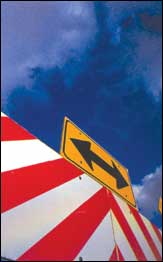 On surveying the present Nepali business landscape, a generational difference becomes clear. In the younger set, leaving instances of youthful arrogance aside, good news is aplenty. There now exist a number of private-sector management colleges in and out of Kathmandu, enrolling more men and women than ever in various BBA, MBA and Executive MBA programs. Two monthlies, The New Business Age and The Boss, have firmly established themselves in the market, complementing each other's business-related coverage. Profiles, even puff pieces, of young entrepreneurs who have, on their own, started successful shopping malls in Pokhara, coffee houses in Thamel or event management companies regularly hit the business page of newspapers.
On surveying the present Nepali business landscape, a generational difference becomes clear. In the younger set, leaving instances of youthful arrogance aside, good news is aplenty. There now exist a number of private-sector management colleges in and out of Kathmandu, enrolling more men and women than ever in various BBA, MBA and Executive MBA programs. Two monthlies, The New Business Age and The Boss, have firmly established themselves in the market, complementing each other's business-related coverage. Profiles, even puff pieces, of young entrepreneurs who have, on their own, started successful shopping malls in Pokhara, coffee houses in Thamel or event management companies regularly hit the business page of newspapers. On meeting, talking and working with a slice of this urban younger section, you sense energy, optimism, an eagerness to learn more and a can-do attitude. When you ask them who their role models in business are, you hear them citing the names of Indian or American businesspeople, but rarely do they make mention of any older non-family-member Nepali businessmen. That, however, should not come as a surprise.
With a few remarkable exceptions, most elderly Nepali businessmen who get written up about in the press for being, well, captains of Nepali private-sector, inspire neither respect nor confidence-as far as younger businesspeople are concerned. There are, for instance, well-known traders, who, upon being blacklisted by banks, rush to rally others of their ilk for collective protection. Then there are those who have long been notorious for never paying their ad agencies, suppliers and, in some cases, even employees for long periods.
There are many who still run their conglomerates in a traditionally closed, command-and-control "munshi-ji" style, forcing any employee with brains to quit within six months of starting. Others seem to spend so much time at politically-charged organisations like the FNCCI that you wonder-unless they operate on extremely high levels of energy (which is doubtful)-how they ever find time to work as CEOs of various companies that are exhaustively listed on their business cards. Still, the worst are those who, upon given a microphone anywhere anytime, see themselves as quasi-Planning Commission members, and start talking about national policies, when all that they can honestly do is talk about their own businesses. As Narayan Manandhar, an economist who studies industrial relations, puts it, "If you really want to appreciate the working style of even an HMG office, try working for one of
these captains of private-sector industries first."
To be sure, most of these elder businessmen have evolved to this present avatar for a reason. Historically, many of them started as traders who could milk the advantages of arbitrage opportunities that arose in trading routes between the Indian planis and Tibet. Few of them started out running competitive entrepreneurial ventures that depended on market forces. As the Nepali state asserted increasing control over commercial activities, the businessmen's success depended on earning the blessings of the HMG bureaucrats and politicians of various parties to get the monopoly licenses.
The name of the game, then, was not free-market capitalism with its attendant set of rules that ensure a level playing field. Instead, the game consisted of fixing and finagling, which led to many legally-sanctioned cartels and interest-groups. They, in turn, legitimised narrow business interests even if it meant distorting the markets. Over the years, one result of all this has been that whenever you talk of ways to make markets competitive and transparent in Nepal, it's these old but politically powerful businessmen who are usually the most vocal ones to oppose market-friendly ideas.
In this context, one strategy for coming years is clear: for any market-reform measure to succeed in Nepal, the fears of the old should be allayed while the optimism of the young need to be built upon.



